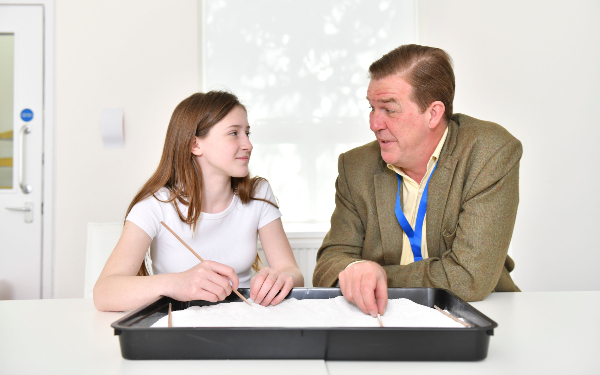
By Anna Glinski, The CSA Centre
As a social worker there were many occasions when a child or young person on my caseload displayed sexual behaviour that was of concern to others. This is unsurprising when we consider the data: over the past year in England, one third of all child protection assessments relating to child sexual abuse concerned a child or young person who had harmed another child or young person.
Whilst children display a range of common and healthy sexual behaviour at different stages of their development, when behaviour sits outside of this range, it may be called ‘harmful’ if it harms themselves or others.
What we know from research is that many, though not all, children who display this behaviour do so because of their own experiences of abuse, neglect, family dysfunction and broken attachments.”
Estimates suggest around a third to a half of these children have learning difficulties or disabilities. With these factors in mind, social workers working across a range of teams are highly likely to come across this issue within their practice.
Social workers ‘expected to be the experts’
Whether we work in family support, initial response, child in need, child protection, disability, children looked after teams, fostering, adoption or leaving care teams, we as social workers will be called upon by other professionals to advise and support when incidents of harmful sexual behaviour take place.
Sadly, in a large part due to decades of insufficient training for social workers on child sexual abuse, we do not always feel equipped to respond to such requests.”
Other professionals expect us – as the ‘experts’ in safeguarding – to know what to do when such incidents take place and I can certainly remember feeling powerless to help in my own practice, before learning about this issue.
Sexual abuse remains a taboo subject – despite significant focus on the issue in the media and by government, the majority of professionals find it difficult to identify, name and respond to concerns.
Professional discomfort leading to poor responses to children
We still see sexually harmful behaviour as different from other types of harmful behaviour and all too often our perceptions and discomfort result in poor responses to children. The volume of cases of sexual abuse in education settings submitted to the Everyone’s Invited website is a stark reminder that all professionals and institutions need to respond better to children and young people who may have experienced sexual abuse or have sexually harmed others.
More CSA guidance
 Community Care Inform Children subscribers can take advantage of comprehensive guidance on child sexual abuse from The CSA Centre. Find out more on our CSA knowledge and practice hub.
Community Care Inform Children subscribers can take advantage of comprehensive guidance on child sexual abuse from The CSA Centre. Find out more on our CSA knowledge and practice hub.
Later in my social work career, I managed an in-house specialist service which worked with children and families affected by child sexual abuse. Part of our role was to offer consultation to social workers, foster carers and schools when there were concerns of harmful sexual behaviour. We found ourselves giving similar advice again and again.
With time we saw the significant difference this advice made to reducing the levels of anxiety experienced by the professionals dealing with these situations. Having clear advice and guidance meant professionals in all settings could respond more confidently to protect and support both the children who had been harmed, and those who had harmed. It is this experience, and those of my colleagues at the Centre of expertise on child sexual abuse (CSA Centre) who have been in similar consultative roles, which led us to develop our Safety Planning in Education guide.
Social workers supporting schools
Last year’s reviews of sexual abuse in education settings by Ofsted (in England) and Estyn (in Wales) further exposed the enormity of the issue in schools. Rough estimates suggest that a child in England spends over a thousand hours a year in school, so it is not surprising that teachers and those in education settings are often the first to identify and respond to incidents of harmful sexual behaviour.
While schools need to respond better, they also need our help. Safeguarding is everyone’s responsibility, but I believe it is social workers who are best placed to support teachers and other professionals in this task. The CSA Centre’s new guidance is, we hope, the first step in giving education settings the support they need to better protect children and young people.
Bearing in mind that you as social workers are likely to be the first point of contact for schools in these situations, we hope that this guidance gives you both the knowledge and resource you need to advise and guide schools.
Our Safety Planning in Education guide is in two sections: Part A looks at the key actions for a school when an incident of harmful sexual behaviour has occurred, including a safety plan template for recording, and reviewing arrangements, and Part B focusses on broader practical advice such as how to communicate with children and their parents in these circumstances and an appendix with useful links and resources.
Developed by professionals, for professionals, it’s been robustly reviewed by academics, teachers, headteachers, local authority safeguarding leads and designated safeguarding leads across a variety of settings including faith schools, residential, mainstream primary and secondary schools, special schools and pupil referral units. We encourage you to download the free Safety Planning in Education guide for free and share it with colleagues.
Anna Glinski is deputy director, knowledge and practice development, at The Centre of expertise on child sexual abuse



 Family help: one local authority’s experience of the model
Family help: one local authority’s experience of the model  ‘I spent the first three months listening’: how supportive leadership can transform children’s services
‘I spent the first three months listening’: how supportive leadership can transform children’s services  How senior leaders in one authority maintain a culture of excellence
How senior leaders in one authority maintain a culture of excellence  How staff support ensures fantastic outcomes for children and families
How staff support ensures fantastic outcomes for children and families  Workforce Insights – showcasing a selection of the sector’s top recruiters
Workforce Insights – showcasing a selection of the sector’s top recruiters 

 Facebook
Facebook X
X LinkedIn
LinkedIn Instagram
Instagram
As an NSPCC Social Worker in Cumbria, I used to work directly with children and young people presenting with concerning and harmful sexual behaviour, providing much needed professional support to Cumbrian schools, parents, carers and to Cumbria Children Services. I would undertake AIM2 and AIM Under 10 assessments and provide structured and targeted post-assessment programmes of intervention…Then, in November last year (2021), the NSPCC closed the Carlisle Service Centre, terminated all of its sexual abuse, sexual exploitation and HSB service provisions to the children across Cumbria and made all of its NSPCC Social Workers in Cumbria redundant!